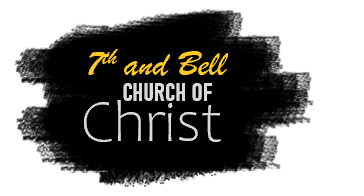
Defining the word “Church”
It is disheartening that so many Christians do not have a good grasp of what the church is. Some would simply define the church as “the people”, which is an incorrect answer that accomplishes two things: 1. It leaves much to self-interpretation and 2. It opens the floodgates of false doctrine to pour into the church, its work, and its worship. But defining the church as the people seems so innocent, how could anything bad come from it? The reality is that even a small amount of false doctrine can have a broad impact on how we understand the rest of the scriptures. Too often false doctrine “snowballs” and we end up far from the gates of the city of God. So, it is a serious matter that we correctly understand the will of God which He has given us in His word. And it is all the more important that we properly understand foundational truths like what is the church, what is a Christian, what is their work, and what is their worship; for truth can also “snowball” and aid us in understanding the rest of the scriptures properly and harmoniously. So, in the coming weeks, I hope to dig into some basic doctrinal points that have a wide range of biblical applications that can greatly aid us in our understanding of all things. It is equally important to go over these things because these same doctrinal points, if understood incorrectly, will have the very opposite effect, and throw our understanding of the word of God off track, leading us to make wrongful applications of scripture. So now, with opening comments out of the way, let’s first discuss the biblical definition of the church.
I suppose it would be best to start with a dictionary definition of the church, as long as we establish that the definition of a word is merely a start. Words without context are an invitation for misinterpretation. A dictionary definition of the word “church” is quite meaningless unless it is seen in light of the context which God gives it. Nevertheless, the word “church” is ekklesia in the original Greek language of the new testament. Ekklesia means “called out”; it is a compound word from ek (“out”), and kaleo (“call”). It is fascinating that ekklesia was not a word made exclusively for the church, or any kind of religious organization; the Greeks used ekklesia as a common word for a gathering of any sort. Thayer’s Greek-English Lexicon defines ekklesia in this way: “a gathering of citizens called out from their homes into some public place, an assembly.” The word is a collective noun, like the words flock, group, army, and assembly, where a collection of people or things are taken as a whole. In other words, ekklesia (church) is a thing that is composed of a plurality of elements. Interestingly, there are other collective nouns in the new testament text that are used synonymously for the church, such as body (Ephesians 1:22-23) and family (1 Timothy 3:15). Literally, a body is a collective of bones, ligaments, muscles, etc., and a family is a collective of people who are related to each other. But these words are used figuratively in the scriptures to illustrate the church, a collective of people. However, just because the word “church” is a collective noun relating to people in plurality, that does not necessitate that the definition of the church is “the people”; as noted before, taking this approach is very presumptuous, and here a few of reasons why:
1. If the church is defined as the people, then that does not define the people. Are they faithful and truthful disciples, or just anyone in the pews (like children) or visitors from the world or false religions? Therefore, under this definition, anybody could be counted as a member of the church so long as they are a person. I know of a situation where the members of a local church were to have a meeting concerning their preacher, for a couple of “hotheads” wanted him out. Guess who showed up to the meeting, every buddy that these hotheads could scavenge from the whole surrounding area. They had enough “numbers” to fire the preacher. Shameful. So the church is not merely people, but if we define it that way, then people are bound to start drawing unscriptural applications from such an inadequate and incomplete definition.
2. If we understand the church to be the people, then we can quickly venture off into territory that is foreign to the scriptural idea of the church. For example, I once had a bible study with an erring brother at a corner booth of a McDonald’s; as we discussed what the church is and what work is set apart for the church as opposed to the work of an individual Christian, he made the point to me that he and I together at McDonald’s that night were “the church”. This is unscriptural. He and I were a part of a local church but we were not the church, and therefore, unable to act in the capacity of the church, or do the work set apart for the church to do. This misunderstanding of what/who the church is has led many churches to stray from the new testament pattern.
3. If the church is simply “the people”, then the church can do whatever the people can do, and vice versa. This is troublesome because God has given separate work for the church to do and for the individual Christian to do; these works are not interchangeable by biblical authority. Once again, confusing the work of the people with the work of the church is likely primarily due to the erroneous definition of the church as the people. The progression goes like this: if the church is the people, then the church is at liberty to do whatever the people can do. But we, as individuals, have a lot of liberties in our lives that cannot be scripturally transitioned into the church. For example, as a person, I am at liberty to be entertained with a movie on television at night, but as a church, we do not have that same liberty of buying a tv and enjoying a movie some night at the building. Watching tv is the liberty of an individual, it is not the work of the church. Again, I am at liberty to use my money to buy myself lunch, but that doesn’t mean that the church is at liberty to use its money to provide lunch for its members. This distinction between the church and the Christian is an important detail that is not often discussed at length, so as part of this article series we will examine the scriptures on this matter in a couple of weeks.
Even two or three are not the church
It seems quite harmless to say that two or three make a church, but there can be far-reaching consequences for this kind of view. First things first, it is not in the bible that two or three gathered together in the name of Christ are the church. So we ought not believe that or say that. Now, Jesus did say something about two or three gathered in His name, but He specifically did not count them as a church. Jesus said, “For where two or three are gathered together in My name, I am there in the midst of them” (Matthew 18:20). Notice that He never called them a church, He only said that He was in their midst; let us be careful not to put words in God’s mouth. The context reveals that He was speaking of the apostles: “I say to you that if two of you [the apostles] agree…” (v.19), and in verse 18, He spoke of the authority of the apostles to bind and loose law (that’s not the work that was given to anyone else to do). So, Jesus is saying that He would be with them, in their midst, when two or three apostles needed to handle a matter and bind a scriptural procedure. He certainly was not saying that two apostles would make a church. Besides, earlier in the context Jesus deliberately separated groups of two and three from the church (verses 16-17), showing that a couple of Christians who are part of the local church cannot get together and do the work of the church. Thus far, we have considered some of the dangers of misunderstanding the biblical meaning of the church; next week we will be able to consider from the scriptures what is God’s definition of the church.
Article by Tanner Campbell
